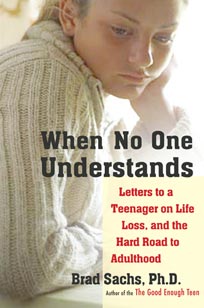
ORDER THE BOOK
READ PROLOGUE
DISCUSSION GUIDES
READ FIRST 3 LETTERS
READ Q & A
Download Discussion Guides
FOR PARENTS
- What aspects of your own adolescence to you remember as most turbulent, most bewildering?
- Which relationships were most helpful to you during this time, and why?
- What comments and efforts that others made were un-helpful, and why?
- What would you have wanted your parents to understand about you or say to you when you were a teenager that they didn’t or couldn’t?
The author proposes that “adolescence happens not only to the adolescent, but to the adolescent’s entire family”.
- In what ways has the process of your child moving through adolescence affected you and your family as a whole—your parents, your spouse, your other children?
- In what ways are these changes positive and in what ways are they negative?
The author writes about the importance of teens traveling from the land of “There must be something wrong with me” to the land of “There must be something important I’m trying to say”.
- What important things might your teen be trying to say that sometime come across as there being “something wrong” with him/her, and is there a way to see his/her problems and difficulties as evidence of there being “something right” with him/her?
The author suggests that adolescent problems often function as a barometer of the family’s overall health and strength, and that these problems invariably point to or suggest unresolved losses, problems, or concerns that exist outside the teen, in other family members, relationships or generations.
- What unresolved issues remain and reside within you, within your marriage or divorce, between you and your other children, or between you and your own parents?
- In what ways might your adolescent’s most challenging behaviors and qualities speak to and encourage you to address these issues?
The author expresses his concern that the contemporary over-emphasis on clinical diagnosis and treatment of teenagers renders parents ineffective, and less confident about their ability to impact upon their children in positive ways.
- How tempted are you to see your son or daughter’s behaviors as evidence of psychopathology or symptomatology?
- Are there times when you have backed off or shied away from trying to influence your son and daughter because of this?
The author writes about playing the role of a “psychological dialysis unit”, housing and metabolizing Amanda’s most discomfiting feelings for her until she was better able to manage them herself.
- In what ways do you see yourself, as a parent, playing the role of “psychodialysis” for your child?
